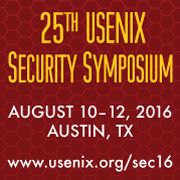
Get more
Help Promote graphics!
Under-Constrained Symbolic Execution: Correctness Checking for Real Code
David A. Ramos and Dawson Engler, Stanford University
Awarded Best Paper!
Software bugs are a well-known source of security vulnerabilities. One technique for finding bugs, symbolic execution, considers all possible inputs to a program but suffers from scalability limitations. This paper uses a variant, under-constrained symbolic execution, that improves scalability by directly checking individual functions, rather than whole programs. We present UC-KLEE, a novel, scalable framework for checking C/C++ systems code, along with two use cases. First, we use UC-KLEE to check whether patches introduce crashes. We check over 800 patches from BIND and OpenSSL and find 12 bugs, including two OpenSSL denial-of-service vulnerabilities. We also verify (with caveats) that 115 patches do not introduce crashes. Second, we use UC-KLEE as a generalized checking framework and implement checkers to find memory leaks, uninitialized data, and unsafe user input. We evaluate the checkers on over 20,000 functions from BIND, OpenSSL, and the Linux kernel, find 67 bugs, and verify that hundreds of functions are leak free and that thousands of functions do not access uninitialized data.
Open Access Media
USENIX is committed to Open Access to the research presented at our events. Papers and proceedings are freely available to everyone once the event begins. Any video, audio, and/or slides that are posted after the event are also free and open to everyone. Support USENIX and our commitment to Open Access.
author = {David A. Ramos and Dawson Engler},
title = {{Under-Constrained} Symbolic Execution: Correctness Checking for Real Code},
booktitle = {24th USENIX Security Symposium (USENIX Security 15)},
year = {2015},
isbn = {978-1-939133-11-3},
address = {Washington, D.C.},
pages = {49--64},
url = {https://www.usenix.org/conference/usenixsecurity15/technical-sessions/presentation/ramos},
publisher = {USENIX Association},
month = aug
}


















connect with us